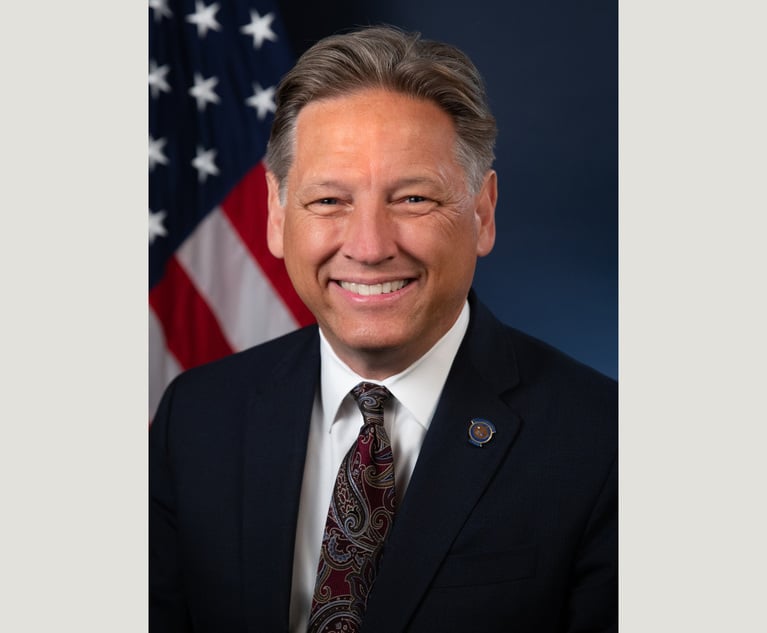The SEC May Lose Again in the Supreme Court in 'Liu v. SEC'
While the SEC's civil-penalty remedy is firmly grounded in the statutes, the disgorgement remedy at the heart of the case up for argument on March 3 has a far murkier basis.
February 28, 2020 at 06:51 PM
9 minute read
 John Berry and Elaine Goldenberg are partners at Munger, Tolles & Olson, LLP (Photo: Courtesy Photo)
John Berry and Elaine Goldenberg are partners at Munger, Tolles & Olson, LLP (Photo: Courtesy Photo)On March 3, the Supreme Court will hear argument in Liu v. SEC, a case presenting yet another challenge to the Securities and Exchange Commission's enforcement powers. The petitioners in that case are facing a $35 million judgment for disgorgement and penalties, obtained by the SEC for their role in an offering fraud. They are challenging whether the SEC has the power to seek the disgorgement remedy, which—after years of unfettered use—has come under heightened scrutiny by the Supreme Court. Much has been written about this case, but we hope to provide a unique perspective because one of us litigated the Liu case as an SEC trial attorney and the other argued for the government in a Supreme Court case, Kokesh v. SEC, that is at the heart of the Liu appeal.
Today, the SEC has (at least for the time being) two basic monetary sanctions in its arsenal: civil penalties and disgorgement. Congress empowered the agency in the mid-1980s to seek civil penalties in insider-trading cases, and in 1990 broadened that power to encompass all SEC cases. The disgorgement remedy has only a slightly longer history. It traces back to the Second Circuit's 1971 ruling in SEC v. Texas Gulf Sulphur Co., when the Second Circuit held that the SEC's statutory authority to obtain injunctions also implied the power to ask a court to award disgorgement—that is, to force a defendant to return the "profits from his violation."
Since then, the SEC has sought and obtained billions of dollars in disgorgement orders from hundreds of thousands of defendants. But while the civil-penalty remedy is firmly grounded in the statutes, the disgorgement remedy has a far murkier basis. Texas Gulf Sulphur and succeeding cases relied on the vague notion that disgorgement is equitable and therefore within the inherent powers of a federal district court. In 2002, Congress amended the securities laws to state that in SEC actions a federal court "may grant[] any equitable relief that may be appropriate or necessary for the benefit of investors." That provision nowhere explicitly gives the SEC the right to ask a court to force a defendant to disgorge his or her illicit profits—and neither does any other statutory provision applicable to the SEC.
Moreover, because Congress never expressly authorized disgorgement in court actions by the SEC, and therefore never set any parameters on that remedy, courts have struggled with the appropriate scope of disgorgement awards. In a Ponzi scheme or offering fraud, a defendant may raise tens of millions of dollars from defrauded investors—but the defendant may spend some of that money on boiler-room commissions to find investors, or maybe even use some of it to purchase or pay for things he promised the investors he would do. Some courts have made the SEC deduct so-called "legitimate" expenses from the disgorgement amount, reducing the remedy to only what a defendant actually received. Other courts have seen no problem in forcing a defendant to return everything he raised from investors, regardless of whether he kept it all or not.
It is against that backdrop that the SEC brought its fraud case in federal district court against Charles Liu and his wife, Lisa Wang. They raised about $26.9 million based on the promise that they would build a proton-therapy cancer treatment center in Southern California, but they did not fulfill that promise. Instead, the court found, they pocketed almost $9 million for themselves, and spent another $13 million on three overseas marketers to help them attract Chinese investors in their project. One of those marketers was ostensibly run by Lisa Wang and owned by her mother. By the time the SEC brought its case, the treatment center was just an empty plot of land and less than $250,000 remained in the project's bank accounts.
The district court granted summary judgment for the SEC and awarded the agency $26.7 million in disgorgement and $8.2 million in civil penalties. The court calculated disgorgement by adding up all of the money the Lius had taken from investors and subtracting the $250,000 that remained in the corporate accounts when the SEC sued.
Just months after the district court entered judgment against the Lius, and before the Ninth Circuit heard the Lius' appeal, the Supreme Court ruled in Kokesh v. SEC that disgorgement in SEC cases is punitive. The question in Kokesh was whether the SEC disgorgement remedy is a "penalty," thus making disgorgement subject to a general federal statute of limitations that limits the time to bring an action for the enforcement of "any civil fine, penalty, or forfeiture." The Court explained that disgorgement is awarded in SEC cases as a consequence for violation of a public law (that is, an offense committed against the government) and is "intended to deter, not to compensate." On that basis, the Court concluded that SEC disgorgement constitutes a punishment and therefore qualifies as a "penalty." The Court also noted that "nothing in this opinion should be interpreted as an opinion on whether courts possess authority to impose disgorgement in SEC enforcement proceedings."
Despite that footnoted caveat, however, the Kokesh ruling may well prove damning for the SEC in Liu. At oral argument in Kokesh, a number of Justices signaled discomfort with the idea that the SEC is collecting a disgorgement remedy that Congress never expressly allowed and that sometimes puts a defendant in a worse position than he would have been in had he never committed the wrongdoing in the first place. And Kokesh's "penalty" analysis signals that disgorgement does not qualify as "equitable relief" under the 2002 statute authorizing that species of remedy. The Supreme Court has said many times, in cases stretching back many years, that equity does not aid in the infliction of penalties. Congress can be presumed to have understood that fundamental distinction when it enacted the statute.
The prospect of a loss for Liu is also cemented by the Supreme Court's track record in cases dealing with the scope of administrative agencies' authority. In a series of recent cases involving various areas of the law, the Court has taken steps to ensure that agencies of the federal government exercise only the powers that Congress has expressly granted by statute. With those separation-of-powers concerns in mind, the Court is likely inclined to try to cut back what some may view as the SEC's virtually unbounded power to obtain disgorgement in court, because that power is not traceable to any clear congressional authorization.
In its brief in the Supreme Court, the government has countered that Congress's 2002 enactment can be understood as a ratification of the pre-existing practice of awarding disgorgement in SEC actions (although the government conspicuously has not defended that pre-existing practice). The government has pointed, for instance, to various statutes that contemplate—but do not authorize—court-ordered disgorgement in an SEC case. The government has also argued that the word "penalty" can be understood in different ways in different contexts and that Kokesh, therefore, should not be viewed as dispositive on the question of whether disgorgement qualifies as "equitable relief." But the government's arguments cut against the grain of the usual mode of statutory interpretation in the Supreme Court's decisions, which eschews reliance on history and congressional intent in favor of strict adherence to the plain meaning of statutory text.
In the end, although the oral argument will be telling, the Supreme Court seems unlikely to conclude that the SEC can continue to obtain disgorgement, in its current form, when the SEC sues a defendant in court. It is theoretically possible that the Court could cut the disgorgement remedy back without eliminating it entirely—for instance, by allowing the SEC to collect only amounts that a defendant personally received and kept from his fraud. But given the Supreme Court's recent track record, the most likely outcome is that the SEC will be entirely disempowered from asking a court to award disgorgement.
If that is how the case turns out, the loss of that disgorgement remedy does not mean that the SEC will be left powerless. The SEC's statutory power to seek civil penalties in court can take up the slack in many of its cases. The SEC has express statutory authorization to seek disgorgement in the agency's administrative forum. And Congress could decide to enact a new statute expressly granting the SEC a disgorgement remedy if Liu does not go the SEC's way.
John Berry and Elaine Goldenberg are partners at Munger Tolles & Olson, LLP. Mr. Berry joined Munger from the SEC in 2019 where he last held the position of Associate Regional Director of the Enforcement Division in the SEC's Los Angeles office; he was the lead counsel for the SEC in SEC v. Liu in federal district court. Ms. Goldenberg came to Munger in 2017 from the U.S. Department of Justice where she served as an Assistant to the Solicitor General; she has argued 12 cases in the Supreme Court, including arguing Kokesh v. SEC for the government.
This content has been archived. It is available through our partners, LexisNexis® and Bloomberg Law.
To view this content, please continue to their sites.
Not a Lexis Subscriber?
Subscribe Now
Not a Bloomberg Law Subscriber?
Subscribe Now
NOT FOR REPRINT
© 2025 ALM Global, LLC, All Rights Reserved. Request academic re-use from www.copyright.com. All other uses, submit a request to [email protected]. For more information visit Asset & Logo Licensing.
You Might Like
View All
After Solving Problems for Presidents, Ron Klain Now Applying Legal Prowess to Helping Airbnb Overturn NYC Ban
7 minute read
DOJ, 10 State AGs File Amended Antitrust Complaint Against RealPage and Big Landlords
4 minute read
Pentagon Settles Suit Seeking to Clear Records of Service Members Discharged for Being LGBTQ
3 minute readLaw Firms Mentioned
Trending Stories
- 1'It's Not Going to Be Pretty': PayPal, Capital One Face Novel Class Actions Over 'Poaching' Commissions Owed Influencers
- 211th Circuit Rejects Trump's Emergency Request as DOJ Prepares to Release Special Counsel's Final Report
- 3Supreme Court Takes Up Challenge to ACA Task Force
- 4'Tragedy of Unspeakable Proportions:' Could Edison, DWP, Face Lawsuits Over LA Wildfires?
- 5Meta Pulls Plug on DEI Programs
Who Got The Work
Michael G. Bongiorno, Andrew Scott Dulberg and Elizabeth E. Driscoll from Wilmer Cutler Pickering Hale and Dorr have stepped in to represent Symbotic Inc., an A.I.-enabled technology platform that focuses on increasing supply chain efficiency, and other defendants in a pending shareholder derivative lawsuit. The case, filed Oct. 2 in Massachusetts District Court by the Brown Law Firm on behalf of Stephen Austen, accuses certain officers and directors of misleading investors in regard to Symbotic's potential for margin growth by failing to disclose that the company was not equipped to timely deploy its systems or manage expenses through project delays. The case, assigned to U.S. District Judge Nathaniel M. Gorton, is 1:24-cv-12522, Austen v. Cohen et al.
Who Got The Work
Edmund Polubinski and Marie Killmond of Davis Polk & Wardwell have entered appearances for data platform software development company MongoDB and other defendants in a pending shareholder derivative lawsuit. The action, filed Oct. 7 in New York Southern District Court by the Brown Law Firm, accuses the company's directors and/or officers of falsely expressing confidence in the company’s restructuring of its sales incentive plan and downplaying the severity of decreases in its upfront commitments. The case is 1:24-cv-07594, Roy v. Ittycheria et al.
Who Got The Work
Amy O. Bruchs and Kurt F. Ellison of Michael Best & Friedrich have entered appearances for Epic Systems Corp. in a pending employment discrimination lawsuit. The suit was filed Sept. 7 in Wisconsin Western District Court by Levine Eisberner LLC and Siri & Glimstad on behalf of a project manager who claims that he was wrongfully terminated after applying for a religious exemption to the defendant's COVID-19 vaccine mandate. The case, assigned to U.S. Magistrate Judge Anita Marie Boor, is 3:24-cv-00630, Secker, Nathan v. Epic Systems Corporation.
Who Got The Work
David X. Sullivan, Thomas J. Finn and Gregory A. Hall from McCarter & English have entered appearances for Sunrun Installation Services in a pending civil rights lawsuit. The complaint was filed Sept. 4 in Connecticut District Court by attorney Robert M. Berke on behalf of former employee George Edward Steins, who was arrested and charged with employing an unregistered home improvement salesperson. The complaint alleges that had Sunrun informed the Connecticut Department of Consumer Protection that the plaintiff's employment had ended in 2017 and that he no longer held Sunrun's home improvement contractor license, he would not have been hit with charges, which were dismissed in May 2024. The case, assigned to U.S. District Judge Jeffrey A. Meyer, is 3:24-cv-01423, Steins v. Sunrun, Inc. et al.
Who Got The Work
Greenberg Traurig shareholder Joshua L. Raskin has entered an appearance for boohoo.com UK Ltd. in a pending patent infringement lawsuit. The suit, filed Sept. 3 in Texas Eastern District Court by Rozier Hardt McDonough on behalf of Alto Dynamics, asserts five patents related to an online shopping platform. The case, assigned to U.S. District Judge Rodney Gilstrap, is 2:24-cv-00719, Alto Dynamics, LLC v. boohoo.com UK Limited.
Featured Firms
Law Offices of Gary Martin Hays & Associates, P.C.
(470) 294-1674
Law Offices of Mark E. Salomone
(857) 444-6468
Smith & Hassler
(713) 739-1250







